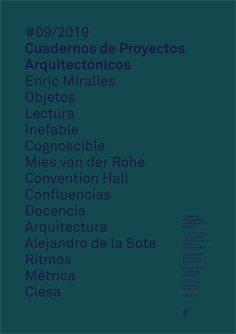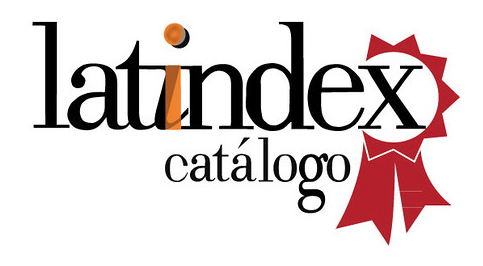Rhythms, Metrics, and Industrial Roof in Alejandro de la Sota’s Clesa Dairy Plant
DOI:
https://doi.org/10.20868/cpa.2019.9.4552Palabras clave:
Rhythms, Metrics, and Industrial Roof in Alejandro de la Sota’s Clesa Dairy PlantResumen
Abstract
The striking modular irregularity of theClesa dairy plant’s structural grid strikes a contrast with the uniformity of other contemporary projects of Alejandro de la Sota. Analysis of the building shows important dimensional variations in its modulations that distance it from the maximum regularity expected, especially for an industrial building. This paper tries to explain the conditions that might have led to the final configuration of the modular grid, as well as the series of changes that were made on the preliminary design. Similarly, we explore the impact that the modifications on the modulation could have had on the definition of the more expressive and characteristic elements of the roofing system. It proved necessary to compare the building with an array of contemporary structural and constructive solutions of industrial architecture roofs. Likewise, issues such as the modular grouping in odd or even numbers of sections proved to be very relevant to the process followed.
Descargas
Referencias
APEL Y BECKERT, “hangar en el aeropuerto de Frankur-am-Main,” Informes de la Construcción, vol. 15, no. 145 (1962).
BURÓN MAESTRO, Manuel. y David. Fernández-Ordóñez Hernández. “Evolución de la prefabricación para la edificación en España. Medio siglo de experiencia,” Informes de la Construcción, vol. 48, no. 448 (marzo/abril 1997): 19-33.
CEHOPU, Taller de lixiviación de Española del Zinc en Cartagena, archivo Fernández Casado. FC-095.
CORRAL LÓPEZ-DORIGA, Alberto. y José. A. Fernández Ordóñez. “Cuatro ejemplos de prefabricación de hormigón pretensado,” TA. Temas de Arquitectura, no. 71 (1965): 9-12.
COUCEIRO, Teresa. Alejandro de la Sota: Central Lechera CLESA: Madrid, 1961. Madrid: Fundación Alejandro de la Sota, 2007.
COUCEIRO, Teresa. “Aprender con Alejandro de la Sota”. Conferencia en Delegación del COAG en Pontevedra, (20 diciembre 2018). https://youtu.be/ EvA1rTxSg5w
DE LA SOTA. Alejandro.. “Alejandro de la Sota. Sencilla justificación de su obra”. Conferencia en la Universidad Menéndez Pelayo, A Coruña, (verano de 1986). https://www.youtube.com/ watch?v=JurZLzdEu6A
DE LA SOTA. Alejandro.. Alejandro de la Sota. Arquitecto. Madrid: Pronaos, 1989.
FERRANDO ÁLVAREZCORTINAS, José Ignacio, Espacios máximos con recursos mínimos, tesis doctoral, Escuela Técnica Superior de Arquitectura de Madrid, UPM, 2015. http:// oa.upm.es/40891/1/JOSE_ IGNACIO_FERRANDO_ ALVAREZ_CORTINAS_01. pdf y http://oa.upm. es/40891/1/JOSE_IGNACIO_ FERRANDO_ALVAREZ_ CORTINAS_02.pdf
FUNDACIÓN ALEJANDRO DE LA SOTA. Archivo digital. https://archivo. alejandrodelasota.org/
HENN, Walter. Buildings for industry, vols. 1 y 2. London: Iliffe books, 1965 (ed. original George D.W. Callwey 1961).
LLINÁS, Josep y José Manuel López Peláez. “Una conversación en torno a CLESA”, ETSAM, (21 octubre 2015). https://vimeo. com/144661918
MELIS, Armando. Gli edifici per le industrie. Torino: S. Lattes & C. editori, 1953.
PAYNE, Charles. “Folded Plates Roof New Hangars”, Architectural Record, no.3, (march, 1958): 223-27.
PIRELLI. “Il nuevo stabilimento di Torino”, Fatti e notizie. Mensile interno per il personale della Pirelli societá per azioni, año V, no. 2-3 (febbraio-marzo 1954).
“PREFABRICACIÓN I”, Informes de la Construcción, no. 113 (1959).
“PREFABRICACIÓN II,”. Informes de la Construcción, no. 114 (1959).
RAMOS AMIEVA, Manuel, ingeniero agrónomo y Alejandro de la Sota, arquitecto. Proyecto de Central Lechera en Madrid. Memoria, Madrid, septiembre 1958.
RODRÍGUEZ CHEDA, José Benito, Alejandro de la Sota. Construcción, idea, arquitectura. COAG. Santiago de Compostela, 1994.
TEMPUL. http://www. entornoajerez.com/2017/04/ jerez-una-ciudad-sin-aguaen- el.html
WINDSOR, Alan. Peter Behrens. Architecte et designer. Bruxelles/Liège: Pierre Mardagá, editeur. 1981. https://en.wikipedia.org/wiki/ List_of_Volkswagen_Group_ factories
Descargas
Publicado
Número
Sección
Licencia
1. Los autores conservan los derechos de autor y garantizan a la revista el derecho de una Licencia Creative Commons Atribución-NoComercial-SinDerivar 4.0 Internacional que permite a otros compartir el trabajo con un reconocimiento de la autoría.
2. Los autores pueden establecer por separado acuerdos adicionales para la distribución no exclusiva de la versión de la obra publicada en la revista (por ejemplo, situarlo en un repositorio institucional o publicarlo en un libro).












